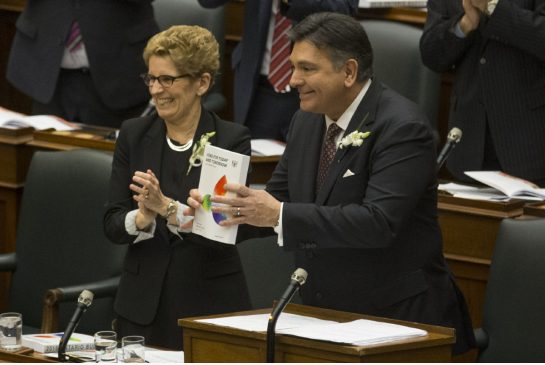Freedom 90 commits to raising its voice to demand an end
to poverty and an end
to the need for food banks and emergency meal programs in
Ontario. |
| February 22, 2016 |
| upstream - Timmie Li - PROOF |
| Food bank stats don't tell the story of food insecurity |
 Food bank stats significantly understate the prevalence of food insecurity. We know this because Statistics Canada has been monitoring the problem nationally for almost a decade through the Canadian Community Health Survey (CCHS). With its rigorous methods and large sample size this survey provides reliable health data at the provincial, territorial and national levels. It reveals more than four million Canadians were food insecure in 2012 - the most recent national estimate we have. Food Banks Canada surveys its members every March to estimate use. In 2012 they estimated that only 882,188 people used food banks that month. The stark difference between the results of the CCHS and Food Banks Canada shows there's a much larger problem than we've understood. Food insecurity in Canada is a national crisis. |
| Read more |
| February 14, 2016 |
| Leaders and Legacies - Elaine Power - Queen's University |
| Food insecurity and the promise of a basic income guarantee |
 A basic income guarantee could replace social assistance, with all its problems, as well as supplement earned income. An adequate basic income would virtually eliminate food insecurity in this country. This is one of the major ways in which basic income would operate to save us money, by improving health and saving costs in the health care system. In addition, if a basic income were effective in addressing poverty, we would see the food banks in this country disappear because no one would need them anymore. Imagine what other projects we could tackle with so much energy and time and enthusiasm released from charitable food provisioning. |
| Read more |
| March 1, 2016 |
| The Star - Opinion/Commentary - Laura Anderson (Wellesley Institute) and Danielle Martin (EvidenceNetwork) |
| Let's get the basic income experiment right |
 Poverty is the biggest determinant of health. As such, we should expect to see significant improvements in health among recipients of a basic income. For example, the Mincome data showed that under a BIG, hospital visits dropped by 8.5 per cent. This included fewer emergency room visits from car crashes and domestic abuse, and fewer mental health visits. In Ontario today, these indicators along with others — such as low birth weight, avoidable hospitalizations, and health system expenditures — are already measured, and a close look at the impact of a BIG on those metrics must be included in a basic income pilot |
| Read more |
| February 26, 2016 |
| Huffington Post - Art Eggleton - The Blog |
| It's Time For Canada To Test A Basic Income |
 Canadians face immense challenges. Many families struggle to pay the rent; they can't afford their children's school supplies or school trips. Many rely on donations at the food bank just to feed their families. In numbers, one in seven Canadians live in poverty. That's over five million people -- including over one million children. And there are an estimated 150,000 to 300,000 people homeless. Last year close to 900, 000 Canadians used food banks every month, with over one third of those children. We also have increasing income and wealth inequality that is changing the core of our society. The Conference Board of Canada gave Canada a "C" grade for inequality, ranking us 12th out of 17 countries studied. |
| Read more |
| February 14, 2016 |
| The Globe and Mail - Editorial |
| The guaranteed annual income: A little idea that might just solve some very big problems |
 Changes in Canadian public policy tend to be incremental, but a groundswell seems to be building for a plan that could radically remake our social benefits structure. The concept is simple. Replace the raft of income-support provisions currently administered, means-tested, audited and doled out by various levels of government – welfare, community housing allowances, employment insurance – with a single benefit. It could be run through the tax system. If your income is below a certain level, you get a cheque. It’s time to test the assumptions in the real world. Launch some guaranteed annual income pilot programs. Let’s see how theory translates into practice in Canada. |
| Read more |
| March 7, 2016 |
| NOW - Malone Mullin |
| Is the fix for poverty as simple as a cheque in the mail? |
 There’s an economic advantage to mincome when you consider the growing costs of poverty. Factoring in health, employment insurance, social transfers and justice system expenses, the national annual burden exceeds $70 billion. Although solutions stare us in the face, we continue to pay for widespread destitution. For example, it’d be cheaper to provide the homeless with their own apartments than having them sleep in a shelter bed that can cost $1,200 a month. Our safety nets are all over the place: a medley of cash transfers for the old, debt relief for students, monthly support for parents and 13 distinct welfare programs make up the Canadian social assistance model. What we’re left with is a disjointed system that sometimes fails to help much at all. To compound the problem, “welfare rates fluctuate according to political whim,” says Sheila Regehr, former director of the National Council of Welfare. “There is no rationale. There’s nothing that pegs it at a rate that means something substantial. It’s just ‘How low can we get it?’” |
| Read more |
| March 7, 2016 |
| Canada Without Poverty - News |
| Canada failing on economic and social rights – UN reports |
 The United Nations Committee on Economic, Social and Cultural Rights (CESCR) released their concluding observations on Canada earlier today. They gave Canada its marching orders to use international human rights across the board to address several areas of concern, including the lack of implementation and protection of economic, cultural and social rights (ESC) for the most vulnerable. |
| Read more |
| February 29, 2016 |
| The Star - Editorial |
| Ontario budget leaves Ontario's poorest children behind |
 Rarely has a Liberal government in Ontario tabled a less child-friendly budget than Jobs for Today and Tomorrow. The highlights of the province's 2016 financial plan - a cap-and-trade carbon-pricing scheme and free college and university tuition for lower-income students - overshadowed the absence of help for children in need. There was a miserable 1.5-per-cent increase in social assistance rates for Ontario's poorest families. To put that in perspective, food prices went up by 4 per cent in January. Transit fares (except for monthly Metropasses) went up by 8.3 per cent in November. |
| Read more |

Freedom 90 needs help with printing, mailing and all the other costs associated with carrying on a province-wide effort. You can make a donation by clicking on the Canada Helps logo. |
|
« February 16, 2016
|
« Newsletter list |
|
Freedom 90
c/o York Region Food Network
350 Industrial Parkway South
Aurora ON L4G 3V7
Join us!
|
|
|